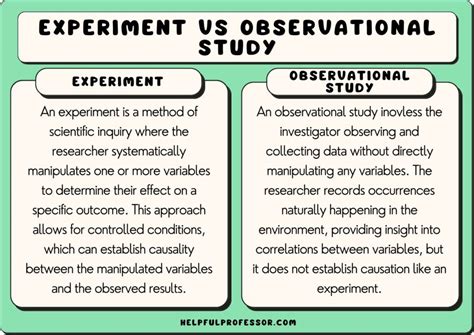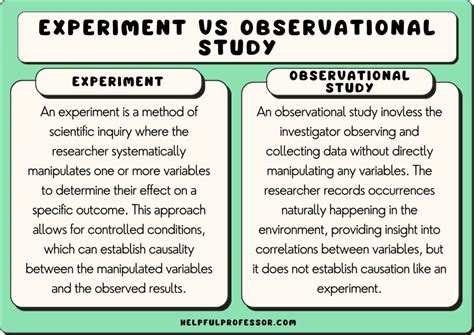Observational Study Vs Experimental Study

When conducting research in various fields, including medicine, psychology, and social sciences, researchers often employ two primary types of studies: observational studies and experimental studies. Understanding the differences between these two study designs is crucial for interpreting research findings and making informed decisions. In this article, we will delve into the characteristics, advantages, and limitations of observational and experimental studies, providing a comprehensive overview of each approach.
Nature of Observational and Experimental Studies

Observational studies involve observing participants or subjects in their natural environment without intervening or manipulating any variables. This type of study aims to identify patterns, correlations, or associations between variables. In contrast, experimental studies involve manipulating one or more independent variables and measuring their effect on a dependent variable. Experimental studies are designed to establish cause-and-effect relationships between variables.
Key Characteristics of Observational Studies
Observational studies are often used when it is not possible or ethical to manipulate variables. They can provide valuable insights into real-world phenomena and are commonly used in epidemiology, sociology, and anthropology. Some key characteristics of observational studies include:
- No manipulation of variables
- Observation of participants in their natural environment
- Aim to identify patterns, correlations, or associations
- Often used in fields where experimentation is not feasible or ethical
Key Characteristics of Experimental Studies
Experimental studies, on the other hand, involve manipulating variables to establish cause-and-effect relationships. They are commonly used in psychology, medicine, and education. Some key characteristics of experimental studies include:
- Manipulation of one or more independent variables
- Measurement of the effect on a dependent variable
- Aim to establish cause-and-effect relationships
- Often used in fields where causality needs to be established
| Study Type | Manipulation of Variables | Aim |
|---|---|---|
| Observational Study | No | Identify patterns, correlations, or associations |
| Experimental Study | Yes | Establish cause-and-effect relationships |

Advantages and Limitations of Observational and Experimental Studies

Both observational and experimental studies have their advantages and limitations. Observational studies are often less expensive and less time-consuming than experimental studies. However, they may be subject to biases and confounding variables, which can limit their validity. Experimental studies, on the other hand, can establish causality, but they may be expensive, time-consuming, and subject to ethical constraints.
Advantages of Observational Studies
Some advantages of observational studies include:
- Cheap and less time-consuming
- Can provide valuable insights into real-world phenomena
- Often used in fields where experimentation is not feasible or ethical
Limitations of Observational Studies
Some limitations of observational studies include:
- Subject to biases and confounding variables
- May not establish causality
- Limited control over variables
Advantages of Experimental Studies
Some advantages of experimental studies include:
- Can establish causality
- High degree of control over variables
- Often used in fields where causality needs to be established
Limitations of Experimental Studies
Some limitations of experimental studies include:
- Expensive and time-consuming
- Subject to ethical constraints
- May not generalize to real-world settings
Key Points
- Observational studies involve observing participants in their natural environment without intervening or manipulating variables.
- Experimental studies involve manipulating one or more independent variables and measuring their effect on a dependent variable.
- Observational studies are often used in fields where experimentation is not feasible or ethical, while experimental studies are commonly used in fields where causality needs to be established.
- Both observational and experimental studies have their advantages and limitations, and the choice of study design depends on the research question, resources, and ethical considerations.
- Understanding the strengths and limitations of both observational and experimental studies is essential for interpreting research findings and making informed decisions.
In conclusion, observational and experimental studies are two distinct research approaches that serve different purposes. While observational studies can provide valuable insights into real-world phenomena, experimental studies can establish causality and inform evidence-based practice. By understanding the characteristics, advantages, and limitations of both study designs, researchers can choose the most appropriate approach for their research question and contribute to the advancement of knowledge in their field.
What is the main difference between observational and experimental studies?
+The main difference between observational and experimental studies is that observational studies involve observing participants in their natural environment without intervening or manipulating variables, while experimental studies involve manipulating one or more independent variables and measuring their effect on a dependent variable.
When are observational studies used?
+Observational studies are often used when it is not possible or ethical to manipulate variables, such as in epidemiology, sociology, and anthropology.
What are the advantages of experimental studies?
+Experimental studies can establish causality, provide a high degree of control over variables, and are often used in fields where causality needs to be established.
What are the limitations of observational studies?
+Observational studies are subject to biases and confounding variables, may not establish causality, and have limited control over variables.
How do researchers choose between observational and experimental studies?
+Researchers choose between observational and experimental studies based on the research question, resources, and ethical considerations. They consider the strengths and limitations of each study design and select the approach that best addresses their research question.



